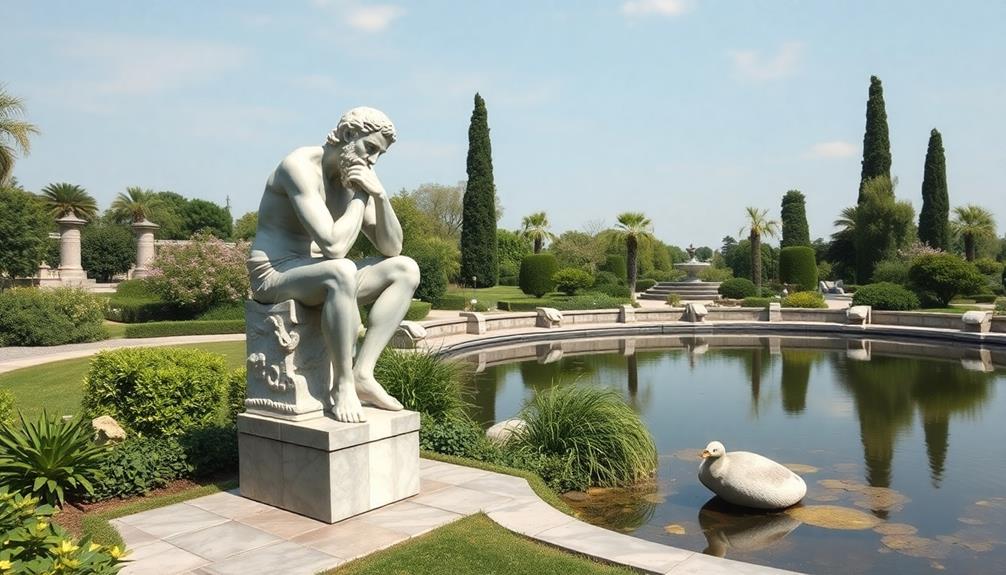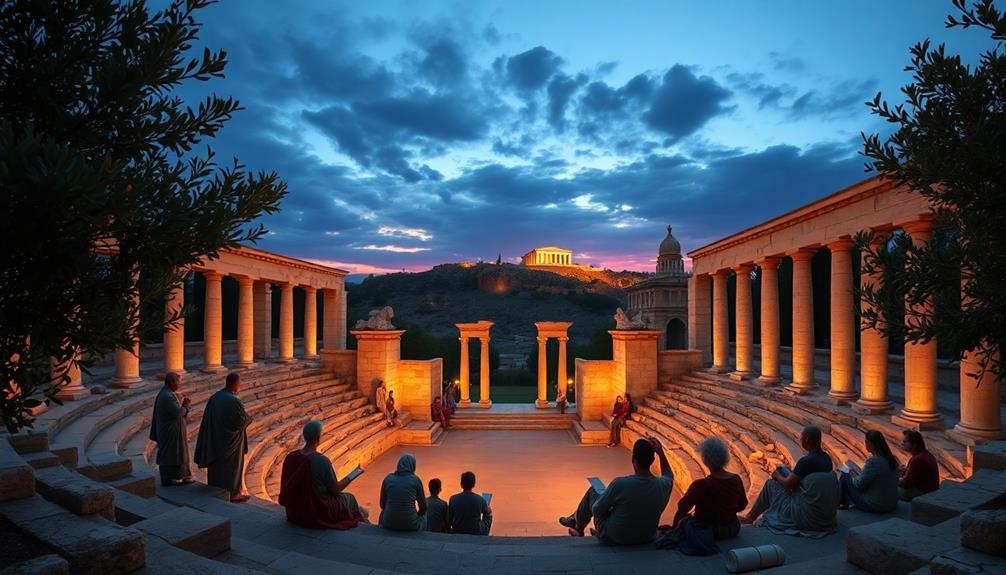Arcesilaus dramatically changed philosophy by steering Plato's Academy towards skepticism. Instead of pursuing dogmatism, he emphasized critical inquiry and the suspension of judgment, known as epoché. This approach allows you to question knowledge claims and promotes flexibility in beliefs. Arcesilaus also critiqued Stoic ideas, arguing for the unreliability of human perception. His dialectical method fosters a culture of debate, pushing you to explore various perspectives rather than settle for absolutes. By prioritizing inquiry over fixed beliefs, he laid a foundation that influences contemporary philosophical discussions. Discover how his ideas continue to shape our understanding of knowledge and ethics today.
Key Takeaways
- Arcesilaus transformed Plato's Academy by shifting its focus from dogmatism to skepticism, emphasizing critical inquiry and dialectical questioning.
- He introduced the concept of epoché, promoting the suspension of judgment on knowledge claims to encourage open-minded exploration.
- His critique of Stoic epistemology questioned the reliability of cognitive impressions, highlighting flaws in human perception and reasoning.
- Arcesilaus emphasized practical wisdom through akatalpsia, advocating for actions based on reason rather than definitive beliefs.
- His legacy influenced future philosophers and fostered a skeptical culture that continues to shape discussions on knowledge and certainty.
Historical Context of Arcesilaus
Understanding the historical context of Arcesilaus is essential for grasping his impact on philosophy. Born around 316/315 BCE in Pitane, Aeolis, he became a pivotal figure in the change of Plato's Academy towards Academic skepticism around 265 BCE. By succeeding Crates as the head of the Academy, Arcesilaus led the institution for over 25 years, steering its focus away from strict adherence to Platonic doctrines. This shift in philosophical direction mirrors the process of resetting and recovering that many individuals experience in their personal lives, as it involves questioning established beliefs and seeking new understandings.
His philosophical approach was deeply influenced by Socratic thought and earlier skeptics like Pyrrho and Timon. This change marked a significant departure from the Old Academy's teachings, as Arcesilaus emphasized the suspension of judgment, or epoché. This shift allowed for a more questioning attitude towards knowledge, challenging the notions of certainty that previously dominated philosophical discussions.
While historical accounts of his philosophy can be complex, they highlight significant contributions preserved through the works of his students and critiques from later philosophers, especially Stoics like Chrysippus.
Arcesilaus' leadership not only redefined the Academy's direction but also laid the groundwork for future developments in skepticism, making him a vital figure in the evolution of philosophical thought.
Life and Philosophical Journey

Arcesilaus' early education shaped his philosophical outlook, drawing heavily from Socratic teachings.
His approach exemplified a form of Cultural Intelligence as he encouraged students to understand and adapt to diverse philosophical perspectives.
As he took the reins of Plato's Academy, he led the shift towards skepticism, encouraging students to question established beliefs.
This transformation marked a pivotal turn in philosophical inquiry, as Arcesilaus introduced the practice of suspending judgment and exploring the limits of knowledge.
Early Education and Influences
Born in 316/315 BCE in Pitane, Aeolis, Arcesilaus kicked off his academic journey with a focus on geometry and astronomy before shifting gears to philosophy. His early education laid a strong foundation that would shape his philosophical pursuits and influence the Academy profoundly.
Understanding the IRA Investment Strategy can similarly provide a framework for critical thinking in financial matters, emphasizing the importance of informed decision-making.
You might find these key influences in his life remarkable:
- Rhetoric Under Theophrastus: Arcesilaus honed his skills in persuasive speaking, which would aid in his philosophical debates.
- Transition to Philosophy: His move to Plato's Academy marked a pivotal moment, as he absorbed teachings from notable figures like Crantor, Polemo, and Crates.
- Socratic Method Emulation: He prioritized dialectical questioning, fostering a culture of critical examination that became central to his philosophical approach.
Even though Arcesilaus didn't write any works himself, his teachings thrived through his students and later philosophers. His educational experiences and philosophical influences not only molded his ideas but also played a significant role in the evolution of skeptical thought within the Academy.
Leadership at Plato's Academy
In 241 BCE, Arcesilaus took the reins of Plato's Academy, ushering in a transformative era that lasted over 25 years. During his leadership, the Academy shifted from dogmatic principles to a more skeptical approach, emphasizing the questioning of knowledge and the suspension of judgment. His philosophical position drew heavily on Socratic thought, encouraging critical dialogue through the dialectical method instead of adhering to fixed doctrines.
Though Arcesilaus didn't produce written works, his ideas were preserved by students and later philosophers, shaping the future of Academic skepticism. He engaged deeply with Stoicism, critiquing their epistemology and asserting the uncertainty of knowledge. This skepticism marked a significant departure from previous teachings.
Here's a quick overview of his contributions:
| Aspect | Details |
|---|---|
| Leadership Duration | Over 25 years |
| Philosophical Shift | From dogmatism to skepticism |
| Method | Dialectical engagement |
| Influence | Socratic thought and Stoicism |
| Legacy | Preserved by students like Pythodorus |
In doing so, Arcesilaus fundamentally altered the trajectory of philosophical inquiry at the Academy.
Shift to Skeptical Philosophy
Shifting from a student of notable philosophers to a leader of Plato's Academy, Arcesilaus embraced skepticism as a cornerstone of his teaching. He marked a significant departure from the Old Academy's focus on Platonic thought, introducing a more critical stance that prioritized inquiry over dogma.
His approach laid the groundwork for what we now recognize as Academic skepticism, characterized by three key elements:
- Suspension of Judgment (epochē): Arcesilaus argued that certainty in knowledge claims is elusive, promoting a mindset that withholds judgment on absolute truths, similar to how Web 3.0 emphasizes user control over data ownership.
- Dialectical Method: He engaged opponents by questioning their views, fostering a dynamic environment that prioritized debate and critical examination over mere acceptance of doctrines.
- Influence on Future Thinkers: His ideas shaped the philosophical landscape, paving the way for subsequent figures like Carneades, who further explored skeptical thought.
Through this shift, Arcesilaus not only transformed the Academy but also set the stage for future developments in Western philosophy. His emphasis on skepticism challenged the very foundation of knowledge, encouraging generations to adopt a more questioning and analytical approach to understanding reality.
Overview of Academic Skepticism

In exploring Academic Skepticism, you'll encounter key philosophical principles that challenge the idea of absolute knowledge.
Arcesilaus and notable figures like Carneades shifted the conversation towards recognizing the limitations of human understanding, much like how the subconscious mind plays a vital role in shaping our realities, as seen in Abraham Hicks on Sleep and Dreams.
Their arguments, particularly the "Argument from Disagreement," highlight how differing beliefs complicate our quest for truth.
Key Philosophical Principles
Often regarded as a profound challenge to established beliefs, Academic Skepticism, as developed by Arcesilaus, argues that absolute certainty in knowledge is simply unattainable. This perspective encourages the suspension of judgment (epochē) about truth claims, leading to several key principles.
Understanding the nuances of uncertainty can be vital in contexts such as money management strategies where absolute knowledge about costs and variances is often elusive.
- Argument from Disagreement: Arcesilaus highlighted the contradictions among knowledgeable individuals, suggesting that if experts can't agree, our beliefs may lack truth or justification.
- Akatalpsia: This concept emphasizes the importance of refraining from making assertions about knowledge, promoting open-minded inquiry rather than dogmatic belief.
- Reasonable Actions (Eulogon): Arcesilaus argued that you can still live well based on reasonable actions, even without definitive knowledge, directly challenging Stoic epistemology, which claims that knowledge is essential for action.
Major Historical Figures
Arcesilaus's transformative role in Academic Skepticism reshaped the philosophical landscape of his time. He redirected the focus of Plato's Academy from dogmatic beliefs to questioning the possibility of certain knowledge. His advocacy for doubt and critical inquiry laid the groundwork for future philosophical discussions.
For over 25 years, Arcesilaus led the Academy, introducing the concept of epoché, or suspension of judgment, which directly challenged Stoic claims about knowledge grounded in cognitive impressions. He is also credited with developing the dialectical method, emphasizing rigorous questioning over affirming doctrines. This approach fostered a skeptical culture among his students, significantly influencing Carneades, who advanced the idea that knowledge is limited to probable conclusions.
Here's a quick overview of major figures in Academic Skepticism:
| Figure | Contribution |
|---|---|
| Arcesilaus | Introduced epoché, focused on doubt |
| Carneades | Advocated for probable knowledge |
| Plato | Established the Academy |
| Stoics | Asserted knowledge via impressions |
Through Arcesilaus, Academic Skepticism has profoundly impacted Western philosophy, urging ongoing exploration of knowledge and belief.
Methodology of Skepticism

Through a dialectical approach, Arcesilaus revolutionized the methodology of skepticism, focusing on engaging with and challenging the views of adversaries rather than promoting fixed doctrines.
This shift marked a significant transformation in the skeptical Academy, emphasizing open-ended inquiry and critical examination. His method hinged on a few core principles, which resonate with contemporary practices that encourage personal growth and resilience, such as transformative approaches.
- Epoché: The suspension of judgment on knowledge claims, fostering a more flexible view of understanding.
- Akatalpsia: The idea that knowledge is unattainable, encouraging you to prioritize reasonable actions over definitive beliefs.
- Critical Engagement: Actively questioning assumptions and beliefs, which lays the groundwork for deeper philosophical inquiry.
Critique of Stoic Epistemology

As you explore Arcesilaus' critique of Stoic epistemology, you'll see how he challenged the reliability of cognitive impressions as a basis for knowledge.
He argued that these impressions fail to guarantee certainty, pushing you to question the very foundations of what you consider true.
This skepticism not only critiques Stoic thought but also invites a deeper reflection on the limitations of human perception and understanding, much like the emotional instability found in individuals with BPD, which can complicate their grasp of reality and truth the impact of BPD on perception.
Cognitive Impressions Challenged
Often, philosophers grapple with the foundations of knowledge, and Arcesilaus took a bold stance against Stoic epistemology by challenging the validity of cognitive impressions. He argued that the Stoics' reliance on these impressions, deemed true and self-evident, was fundamentally flawed.
Aromatherapy can stimulate the limbic system, influencing emotions and memory, which highlights the complexities of human perception. Here's how he critiqued their approach:
- Self-Warranting Conditions: Arcesilaus contended that the conditions for cognitive impressions to be self-warranting were never truly met.
- Inherent Flaws: He emphasized that human perception and reasoning are inherently flawed, making absolute certainty in knowledge unattainable.
- Ethical Implications: His critique extended to the Stoic belief that virtue alone is sufficient for happiness, revealing the need for a deeper understanding of knowledge's role in ethical living.
Through these arguments, Arcesilaus not only weakened the Stoic epistemological framework but also advanced philosophical skepticism. His challenges prompted a necessary re-evaluation of knowledge claims, shaping the discourse in both Academic skepticism and Stoic thought.
This shift laid the groundwork for future philosophical inquiry, illustrating the lasting impact of Arcesilaus's ideas.
Knowledge and Certainty Questioned
Arcesilaus's critique of Stoic epistemology fundamentally questions the very nature of knowledge and certainty. He challenges the Stoic belief that cognitive impressions can serve as self-warranting knowledge, asserting that such conditions are never truly met.
This skepticism leads you to reconsider the reliability of sensory perceptions, much like how ethical considerations in educational data mining emphasize the importance of scrutinizing data sources. Instead of firmly grasping knowledge claims, he advocates for suspension of judgment, or epoché, urging you to refrain from forming definitive beliefs based on potentially misleading impressions.
His perspective highlights a significant philosophical divide between Stoicism and Academic skepticism. While Stoics like Chrysippus argue that certainty is critical for virtuous action, Arcesilaus contends that wisdom and reasonable actions can exist without absolute certainty.
This rejection of fixed knowledge prompts Stoics to refine their positions, demonstrating the tension inherent in their contrasting views.
Nature of Arcesilaus' Skepticism

Challenging traditional notions of knowledge, Arcesilaus introduced a radical form of skepticism that emphasizes the universal suspension of judgment, or epochē. He believed that no beliefs can be definitively accepted as true, arguing against Stoic epistemology, which relied on cognitive impressions as knowledge's foundation.
Instead, he focused on a dialectical method that scrutinized opponents' claims without establishing his own doctrines.
Here are three key aspects of Arcesilaus' skepticism:
- Dialectical Approach: He engaged in debates to refute claims, pushing for deeper examination rather than asserting his own beliefs.
- Method over Doctrine: Arcesilaus viewed skepticism as a dynamic method, advocating for continual questioning rather than fixed beliefs.
- Psychological Dimensions: His ideas introduced concepts like inapprehensibility and action without assent, highlighting the complexities of human thought and behavior.
Commitment Types in Skepticism

Commitment types in skepticism reveal the nuanced landscape of Arcesilaus' philosophical thought. He proposed three candidate doctrines: inapprehensibility, universal suspension, and the theory of action without assent. Universal suspension stands out, as it emphasizes that you can't form or accept beliefs, leading to radical doubt. By rejecting the idea of definitive knowledge, Arcesilaus challenges conventional understanding of belief systems.
Weaker commitments identified by scholars include Non-Rational Non-Belief (NRNB), Rational Non-Belief (RNB), and Non-Rational Belief (NRB). These commitment types illustrate the complexity of Arcesilaus' skepticism and how individuals process knowledge and beliefs. NRNB, for example, suggests that you can exist without any rational beliefs, while RNB implies a conscious rejection of rational belief. NRB, on the other hand, indicates a belief without rational justification.
This emphasis on the psychological aspects of skepticism helps clarify Arcesilaus' contributions to philosophy. By focusing on how you process knowledge, he reshapes the discourse surrounding skepticism and belief.
Understanding these commitment types enriches your grasp of Arcesilaus' radical ideas and their implications for philosophical inquiry.
Practical Implications of Skepticism

Skepticism can lead to practical insights that transform how you navigate daily life. Embracing practical skepticism allows you to take action based on what's reasonable, even without absolute certainty. Here are three ways this approach can benefit you:
- Adaptive Thinking: By suspending judgment (epokhē), you create space for flexibility in your beliefs. This helps you respond to changing circumstances without being bound by rigid doctrines.
- Informed Decisions: You can make reasonable actions based on reflection rather than the pressure to hold firm beliefs. This fosters a mindset where decisions are shaped by context rather than dogma.
- Emotional Tranquility: Recognizing that you don't need definitive knowledge for effective living can lead to greater peace of mind. You can focus on what's reasonable and practical, reducing anxiety over the unknown.
Arcesilaus' ideas encourage you to trust your instincts and habits.
Legacy and Influence

Through his leadership at Plato's Academy, Arcesilaus transformed philosophical inquiry by shifting the focus from dogmatic beliefs to a more skeptical approach. His tenure marked a pivotal shift towards Academic Skepticism, where the concept of epoché, or suspension of judgment, became central. This shift challenged the notion of certain knowledge, emphasizing the importance of doubt and critical inquiry in philosophy.
Arcesilaus' critiques of Stoic epistemology sparked significant debates, refining Stoic thought and enhancing the understanding of knowledge acquisition. By questioning established beliefs, he laid the groundwork for future philosophers, like Carneades, who further developed skeptical arguments. Their discussions reinforced skepticism's role in philosophical discourse, highlighting how inquiry can lead to deeper insights.
The legacy of Arcesilaus' skepticism continues to resonate today, influencing contemporary discussions about knowledge and certainty. His commitment to questioning and examining beliefs has shaped the landscape of philosophy, encouraging you to engage with ideas critically rather than accept them at face value.
In doing so, Arcesilaus not only altered the direction of philosophical inquiry in his time but also created a lasting impact that inspires ongoing exploration of skepticism in the quest for knowledge.
Key Concepts and Terminology

Arcesilaus' influence on philosophical thought is evident in the key concepts and terminology that emerged from his ideas. His approach revolutionized skepticism and introduced several important notions that continue to resonate today.
Here are three fundamental concepts:
- Epoché: This central idea represents the suspension of judgment about knowledge claims. By practicing epoché, you open yourself to inquiry without feeling pressured to commit to any definitive beliefs.
- Akatalpsia: This doctrine emphasizes that certainty in knowledge is unattainable, urging you to adopt a universal suspension of assent. It encourages you to recognize the limits of what can be known.
- Dialectical Method: Stemming from the Socratic tradition, this method emphasizes questioning and challenging others' views instead of affirming your own beliefs. It reflects Arcesilaus' skeptical nature, promoting a dynamic exchange of ideas.
In addition to these, terms like Eulogon and Non-Rational Non-Belief (NRNB) highlight the importance of practical wisdom and the ability to act without forming rational beliefs.
Collectively, these concepts showcase how Arcesilaus transformed philosophical discourse.
Frequently Asked Questions
What Were the Major Influences on Arcesilaus' Philosophical Thought?
Arcesilaus' philosophical thought was influenced by Socratic skepticism, Platonic ideals, and earlier Stoic principles. You'll find that his engagement with these ideas shaped his unique approach to epistemology and ethics, emphasizing inquiry and the search for truth.
How Did Arcesilaus' Skepticism Differ From Earlier Skepticism?
About 80% of ancient skeptics focused on absolute certainty. In contrast, Arcesilaus emphasized the importance of doubt, promoting a more practical skepticism that encouraged questioning rather than asserting definitive knowledge, shaping philosophical discourse considerably.
What Was Arcesilaus' Relationship With Other Philosophers of His Time?
Arcesilaus often engaged with contemporaries, challenging their views and promoting skepticism. He built connections with other philosophers, emphasizing dialogue and debate, which helped shape his ideas while influencing the philosophical landscape of his time.
Did Arcesilaus Leave Any Written Works Behind?
Though you might imagine Arcesilaus typing away on a laptop, he didn't leave behind any written works. Instead, his ideas were shared through his students, who preserved his teachings and philosophy for future generations.
How Is Arcesilaus Viewed in Modern Philosophy?
You'll find Arcesilaus viewed as a significant figure in modern philosophy. His ideas on skepticism and dialectics influence contemporary thought, prompting you to contemplate how his teachings challenge dogmatism and encourage critical examination of beliefs.
Conclusion
Just like a ship steering through fog, Arcesilaus' ideas cut through the murky waters of certainty, guiding us toward a more flexible understanding of knowledge. His approach teaches us that questioning isn't a sign of weakness but a powerful tool for discovery. By embracing skepticism, we can chart our own course through the vast ocean of thought, allowing us to explore new horizons while remaining anchored in critical reflection. In this journey, every doubt becomes a stepping stone to wisdom.









